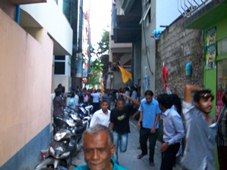A protest launched by the ruling Maldivian Democratic Party (MDP) turned violent today after party activists clashed with supporters of former President Maumoon Abdul Gayoom in front of his residence Enderimaage, in the Maafanu ward of Male’.
MDP MPs and activists gathered outside the Supreme Court at 3pm this afternoon in anticipation of a verdict in a case filed by Umar Naseer – an interim council member of Gayoom’s Progressive Party of Maldives (PPM) – challenging the legitimacy of Thimarafushi MP Mohamed Musthafa’s candidacy on the grounds that he had a decreed debt.
Earlier in the day, the MDP national council conducted an emergency meeting and approved a resolution to launch a protest against the judiciary, claiming judges were unduly influenced by the former President and his half-brother MP Abdulla Yameen.
However a verdict was not delivered by the Supreme Court today, which said the hearing was called “to clarify a few points after reviewing the case.”
After Musthafa emerged from the hearing, the protesters marched towards Endherimaage, where violent clashes erupted between MDP activists and a few Gayoom supporters blocking the entrance to his residence.
 The clashes occurred after a large piece of wood allegedly thrown from Endherimaage struck a 17-year-old demonstrator or bystander, who was immediately rushed to hospital on a passing pick-up.
The clashes occurred after a large piece of wood allegedly thrown from Endherimaage struck a 17-year-old demonstrator or bystander, who was immediately rushed to hospital on a passing pick-up.
Minivan News journalists at the scene observed gravel, rocks, hot water and sharp metal raining down on protesters from the top floors or terrace of Endherimaage.
Several activists claimed they saw Gassan Maumoon, former President Gayoom’s son, throw stones and pour boiling hot water on the protesters.
MDP activists meanwhile threw large stones at Endhirmaage and attempted to break down the door.
Some windows of the house were smashed while a car parked outside was damaged.
The 17-year-old is currently undergoing surgery at the Intensive Care Unit (ICU) at the Indira Gandhi Memorial Hospital (IGMH). A number of MDP MPs and senior members are waiting at the hospital.
MP Ali Waheed told state broadcaster MNBC that the boy was behind MP Alhan Fahmy when the piece of wood struck him straight on the head.
MNBC One showed blood stains on the MPs’ shirt, which Ali Waheed said resulted from the injury to the boy. The state broadcaster also reported that other people at the area were hurt from falling objects.
Speaking to Minivan News outside IGMH, the brother of the injured boy said that according to doctors “his skull was damaged and parts of the skull have gone inside his brain.”
“He was hit in the right side of his head and the left side of his body is now paralysed,” the relative said.
Doctors could not predict how long the surgery would take, he added.
”The doctors said the surgery was to remove the particles from inside his brain,” he said.
Some of the MDP supporters outside the hospital claimed the boy was hit by a wooden  door hurled from the terrace of Endherimaage by Gassan Maumoom.
door hurled from the terrace of Endherimaage by Gassan Maumoom.
Police spokesman Sub-Inspector Ahmed Shiyam confirmed to Minivan News that police were investigating reports that the object was thrown from the Endherimaage building.
“We are questioning the witnesses to try and determine how this happened,” Shiyam said.
“This is a very serious issue. Because of this there might be other problems and we do not want there to be political violence.”
Meanwhile in an interview with private broadcaster DhiTV this evening, Gayoom condemned the protest and claimed the violence was organised by the government.
Gayoom said he saw senior MDP members such as Male’ City Mayor ‘Maizan’ Ali Manik and Executive Services Secretary at the President’s Office Mohamed Ziyad. Minivan News also observed Ziyad and Maizan Alibe at the protest.
“They came with their activists and attacked my home,” Gayoom said. “They attacked nearby houses as well.”
As riot police were not at the scene to intercede, said Gayoom, Chief of Defence Forces Moosa Jaleel and Police Commissioner Ahmed Faseeh should “personally bear responsibility” for the damage.
Gayoom said he would inform foreign governments of today’s events.